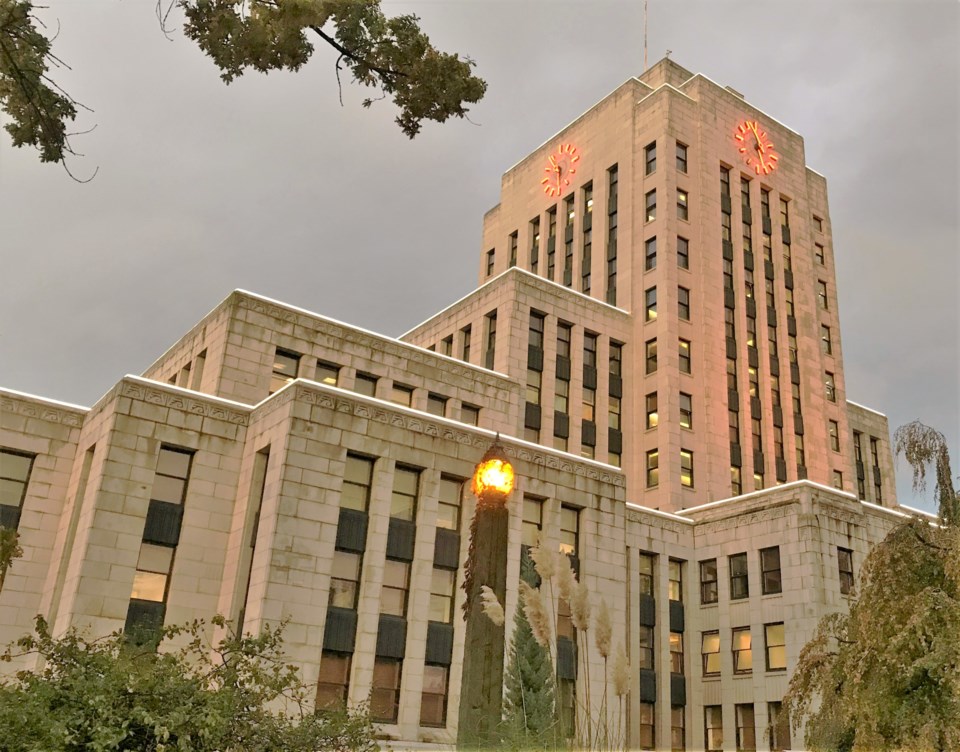Vancouver Mayor Kennedy Stewart leads a crowded pack of mayoral candidates ahead of the October 15 municipal election with 17.1 per cent support from those surveyed, according to a new Mainstreet Research poll.
He is followed by Coun. Colleen Hardwick (13.2 per cent), entrepreneur and backroom political strategist Mark Marissen (11.3 per cent), entrepreneur Ken Sim (10.9 per cent) and Park Board commissioner John Coupar (6.1 per cent). Activist Golok Buday is much further back, with 1.3 per cent of the vote.
The poll, originally published in iPolitics, showed much room for each of the candidates to gain support, given that 40.2 per cent of 552 adults surveyed between July 25 and July 27 said that they were undecided.
Undecided voters, however, might not vote. In 2018, the Vancouver mayoral election only generated 39.4 per cent voter turnout.
Marissen told BIV earlier today that he believes the election will turn less on how the five main candidates split the vote, and more on how much candidates are able to mobilize their supporters to get to polling booths.
Of male voters surveyed, 19 per cent back Stewart, 17.1 per cent back Marissen, 9.8 per cent back Sim, 9.6 per cent back Hardwick and seven per cent back Coupar.
Non-binary people are more firmly behind Stewart (25.3 per cent), but also support Sim (20.6 per cent), and Marissen (11 per cent.) Hardwick is much further back among that voter group, with 2.3 per cent. Coupar had no support in that voting group among those surveyed.
Hardwick – the only female contender – is in the lead among women voters, with support from 16.7 per cent those surveyed. Stewart is next with 15.2-per-cent support from female voters, while Sim has 11.8 per cent, Marissen has 5.8 per cent and Coupar has 5.3 per cent.
"I'm glad to hear that the women's vote is supporting me," Hardwick told BIV when informed of the poll results. "After 136 years, I think the prospect of having our first woman mayor, well, it's time."
Hardwick also has the youth vote. Her 15.6-per-cent support among people aged 18 to 49 years edges out Stewart's 15.3-per-cent support level in that age group. Marissen is next with 11.9 per cent, followed by Sim (4.9 per cent) and Coupar (4.5 per cent).
Stewart has 19.3-per-cent support from people aged between 50 and 64 years, followed by Sim (18.2 per cent), Marissen (12 per cent), Coupar (8.3 per cent) and Hardwick (7.7 per cent).
Those aged 65 years and older tend to prefer Stewart (19.4 per cent), followed by Sim (18.2 per cent), Hardwick (13.5 per cent), Marissen (8.5 per cent) and Coupar (7.6 per cent.)
Voters' education levels may be a factor in the election.
Stewart is leading among those who have high school education or less (16.9 per cent), and those who have college or trade school education (16.2 per cent). Hardwick's 18.6-per-cent support among those who have university education beats the 17.8-per-cent support level that Stewart – a former Simon Fraser University professor – enjoys.
Stewart leads in most income categories.
His 20-per-cent support among those who make less than $50,000 annually is more than Marissen's 17-per-cent support level from that group. Hardwick's 17.6-per-cent support from people who make between $50,000 and $75,000 is better than Stewart's 14.7-per-cent support, but Stewart leads with 16.3-per-cent support from those who make between $75,000 and $100,000, and 16.7-per-cent support from those who earn more than $100,000 annually.
Despite those strong numbers for Stewart, most Vancouver voters are not satisfied with Vancouver city council's performance.
Only 40 per cent of those surveyed were satisfied with Vancouver's municipal government –seven per cent said that they were "very satisfied" and 33 per cent said they were "somewhat satisfied."
In contrast, 60 per cent said that they were not satisfied with Vancouver's municipal government – 25 per cent said that they were "somewhat dissatisfied" with the government, while 35 per cent said that they were "very dissatisfied."
When asked directly about what they thought about Stewart, 33 per cent said that they strongly disapproved of his performance, while 27 per cent said that they somewhat disapproved of his performance, 31 per cent said that they somewhat approved of his work and nine per cent said that they strongly approved of his performance.
The survey found that the top election issues are:
• creating affordable housing (39 per cent);
• lowering taxes (23 per cent);
• increasing or improving services (16 per cent);
• improving transit (13 per cent); and
• roads and infrastructure (nine per cent.)
Voters overwhelmingly (82 per cent) said housing in the city is unaffordable, with 14 per cent believing that housing is "about the right price," and five per cent saying that they thought housing in Vancouver was "affordable."
Despite that general agreement that housing is unaffordable, only 36 per cent of those surveyed thought that more housing should be built near where they live, and 64 per cent said that there were "enough homes where I live."
Much of Hardwick's support has come from people who opposed city council's recent move to approve a new plan for West Broadway between Clark Drive and Vine Street that increased density. Coupar also has strong support among those who oppose more density, with 80.9 per cent of his supporters saying that they do not want more homes where they live. Of Sim's supporters, 76.1 per cent do not want more homes where they live.
Stewart and Marissen's supporters most say they that they favour more density. Slightly more than half of Stewart's supporters say they want more homes where they live, while 43.3 per cent of Marissen's supporters said that.




